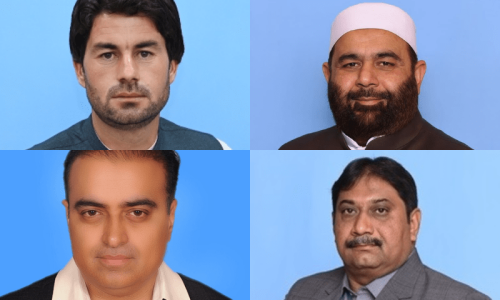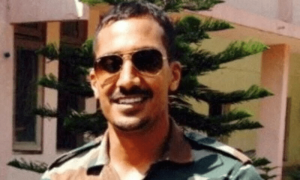KARACHI: Radio has gone through a significant evolutionary process in Pakistan over the decades since independence. Whereas once upon a time Radio Pakistan dominated the airwaves, bringing people news, information and entertainment, today, frequency modulation, or FM, radio stations belonging to a variety of public and private owners populate the landscape.
Without doubt, FM stations have played an instrumental role in the revival of radio in Pakistan, giving the medium a new lease on life. Thus today, as we observe World Radio Day, we should thank the FM transmitter for bringing radio to a new generation of Pakistanis. Before the advent of TV and much before the internet became a reality, radio was the most important electronic medium in Pakistan and indeed the rest of the world. While the Pakistan Broadcasting Corporation (PBC) — better known as Radio Pakistan — started broadcasting from Lahore (stations also existed in Peshawar and Dhaka, or Dacca as it was then known), in the years following independence stations were soon established in other cities.
Being a state-owned enterprise, the news broadcast on Radio Pakistan was only what the government wanted you to hear. Otherwise, there was an interesting mix of cultural, musical and religious programming on offer. The language used on air — as far as Urdu and English broadcasting was concerned — was top-notch, with absolutely no room for slang or banter used on the street.
In fact it would not be wrong to say that people could improve their pronunciation by listening to Radio Pakistan.
This writer remembers some veterans of Radio Pakistan telling him that presenters were thoroughly coached in the art of proper pronunciation before being allowed in front of the microphone. Compared with much of the stuff that makes it to the airwaves today, Radio Pakistan would only accept the King’s Urdu, and nothing else.
However, with the advent of television, radio began to lose much of its prestige to its younger sibling. Indeed, video — or TV — was on the verge of killing the radio star. This would all change in the 1990s, when the young, chirpy and at times brash FM radio entered the market.
Even where FM broadcasting is concerned, Radio Pakistan was the pioneer, launching the FM Gold service in 1993. Yet unlike the global standard, this channel played recorded material and could hardly make an impact.
It was not until the privately-owned FM100 entered the scene in 1994 that the ‘FM culture’ struck roots in the country. Beginning originally in the three metros — Karachi, Lahore and Islamabad — FM100 introduced a youthful and much more street-savvy live style to the radio-listening audience.
The playlist was eclectic, featuring slots for local pop acts, Western pop music, as well as semi-classical Eastern numbers. The DJs, or RJs as they are now referred to, were mostly young men and women who would intersperse the tracks with fluffy, light banter.
If Radio Pakistan was a five-course formal sit-down dinner, FM radio was fast food to be consumed on the go. It was radio for the modern age.
Learning from its earlier experiences, Radio Pakistan got back into the act in 1998, launching its FM101 platform also in the three metros. Taking a leaf out of the FM100 book, 101 also introduced young DJs who could chat up the audience on pop culture, sports and poetry in jargon the urban youth of Pakistan could identify with. From thereon, as the new millennium approached, the country witnessed explosive growth in FM radio channels.
From two FM stations in 1998, today, as per the Pakistan Electronic Media Regulatory Authority’s figures, licences have thus far been issued to 143 commercial and 45 non-commercial entities from Gwadar and Karachi in the south, to Gilgit and Skardu in the north.
From the PBC behemoth that once closely guarded its hold over radio broadcasting in Pakistan, today a motley crew of owners operate FM radio stations in Pakistan. These include media conglomerates, seths and industrialists, as well as stations operated by state bodies and universities.
Today there is a wide variety of FM radio programming available in Pakistan, from accented RJs playing ‘indie’ music from the clubs of New York and London to their elite urban listeners, to more folksy broadcasts in regional languages in Pakistan’s secondary cities.
Such was the appeal of FM broadcasting that, once upon a time, even militants used the format; Mullah Fazlullah, fondly known as Mullah Radio, was an avid broadcaster before the state decided to pull the plug on his shenanigans.
“The dust that had gathered on radio sets has been brushed off” by FM radio, says Nisar Memon, a veteran radio man who served PBC for decades and was involved in setting up FM101. “Today the driver is the primary listener of FM radio,” he adds.
Indeed, today, a wide variety of listeners, from the man on the street to the elite, seem to have an ear tuned to FM radio, especially since FM receivers in smartphones and in car decks have made listening in even easier.
Just as FM revived and rejuvenated radio in Pakistan in the 1990s, today, internet-based radio and convergence of media may throw up even newer formats or programming styles. While at one time preparations were being made for radio’s funeral, today the future for this medium in the country seems bright.
Published in Dawn February 13th, 2017













































